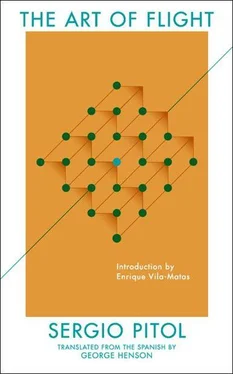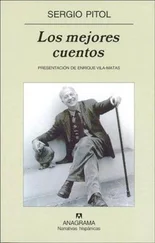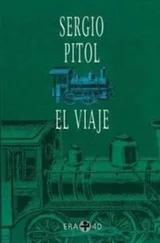Sergio Pitol - The Art of Flight
Здесь есть возможность читать онлайн «Sergio Pitol - The Art of Flight» весь текст электронной книги совершенно бесплатно (целиком полную версию без сокращений). В некоторых случаях можно слушать аудио, скачать через торрент в формате fb2 и присутствует краткое содержание. Год выпуска: 2015, Издательство: Deep Vellum, Жанр: Современная проза, на английском языке. Описание произведения, (предисловие) а так же отзывы посетителей доступны на портале библиотеки ЛибКат.
- Название:The Art of Flight
- Автор:
- Издательство:Deep Vellum
- Жанр:
- Год:2015
- ISBN:нет данных
- Рейтинг книги:5 / 5. Голосов: 1
-
Избранное:Добавить в избранное
- Отзывы:
-
Ваша оценка:
- 100
- 1
- 2
- 3
- 4
- 5
The Art of Flight: краткое содержание, описание и аннотация
Предлагаем к чтению аннотацию, описание, краткое содержание или предисловие (зависит от того, что написал сам автор книги «The Art of Flight»). Если вы не нашли необходимую информацию о книге — напишите в комментариях, мы постараемся отыскать её.
The first work in Pitol's "Trilogy of Memory," The Art of Flight imaginatively blends the genres of fiction and memoir in a Borgesian swirl of contemplation and mystery, expanding our understanding and appreciation of what literature can be and what it can do.
The Art of Flight — читать онлайн бесплатно полную книгу (весь текст) целиком
Ниже представлен текст книги, разбитый по страницам. Система сохранения места последней прочитанной страницы, позволяет с удобством читать онлайн бесплатно книгу «The Art of Flight», без необходимости каждый раз заново искать на чём Вы остановились. Поставьте закладку, и сможете в любой момент перейти на страницу, на которой закончили чтение.
Интервал:
Закладка:
Of course, apart from demonstrating to Federico, whom I expected to miraculously free me from nicotine, an oral expression polluted by some stylistic processes, I refrained from adding everything else. It seemed like an abuse to ask a doctor to return my lost health to me and to blurt out to him on an empty stomach a speech on the radical solitude of man and the impossibility of attaining by rational means the truth or of arriving at it by approximations and estimates. The pretentious enunciation of those clichés was considerably watered down. Federico allowed me speak a bit more about the history of my tobacco use and its tribulations. Then he explained in a cursory way what his method consisted of and, just like that, I was hypnotized. At that moment, the most profound experience I’ve known in my adult life began. I’ve tried to decipher it on various occasions and after a few lines, I give up. The only thing I can do, and I won’t try to do any more, is transcribe the process.
We were discussing how Federico Pérez began to hypnotize me. He gave me the instructions necessary to cross the threshold of my inner self; at a given moment he discovered that I was in a trance and could therefore begin the treatment. I should add that I submit to any curative experience with the credulity of a child. I become the tamest lamb that anyone ever imagined. All personal resistance disappears. Allopathic or homeopathic doctors, magnetists, shamans, acupuncturists, curanderos , it doesn’t matter: I surrender my faith immediately and entirely to them. Any hint of skepticism disappears. The afternoon of 14 October 1991, the same thing happened, except magnified. I knew through Juan Villoro, his brother-in-law, that Federico worked miracles, and that he had broken the creative paralysis produced by writer’s block, as if the void that existed between the page written several years ago and the most recent one had never existed. I was convinced that if he had achieved that, freeing me from nicotine would be child’s play for him. A woman in Prague with magnetic powers had passed her hands over my chest a few times and the desire to smoke had disappeared instantly, as if my fingers had never touched a cigarette. A few years later, on a plane, someone offered me one, I lit it almost without realizing it, and the torture began anew. Suddenly, while I listened to Federico’s words, I began to feel in my chest and on my arms the same heat that invaded me when the magnetist in Prague passed her hands a few centimeters from my body.
I went to Córdoba yesterday. I spent a good while going through family photo albums with my uncle Agustín Deméneghi and my cousin Luis. In them, I found two photographs that I brought home. One is of my mother and my sister Irma, taken shortly before their deaths; I’m almost sure that it’s the last photo of my mother. She’s leaning on a white automobile; the landscape is rustic, and she has in her arms a beautiful little girl of three or four years of age. My mother’s face is sullen, severe; she had made decisions that would change her life, and ours, my uncle told me. Her demeanor is different than in other photographs I know of her. Her seriousness contrasts with the radiant happiness of the girl who’s holding out her arms to the person taking the picture. The other photo is of my sister Irma, sitting on a tricycle, taken a few days later. The transformation is startling. She looks like another girl, whose only similarity to the other is her extremely blonde, straw-like hair; but no trace of the happiness that previously lit up her face remains. In the few days that separated one from the other something monstrous had happened: the death of my mother. That would explain the tragic withdrawal. My tiny sister, a year younger than I, was not able to survive that tragedy. A few weeks later, she would also die. Looking at those portraits fills me once again with an inextinguishable anger and pain.
Federico Pérez asks me to remember a few moments in my life I consider to have been important. And suddenly, without having to make the slightest effort, a curious mix of images begins to parade before me, as if an invisible projector were reflecting them before my eyes. They are significantly enlarged photos, where even the minutest details appear with surprising clarity. There is no chronological order, or any other sort, to their appearance; at least I’m not able to find the threads that unite them. Especially because they pass before me with dizzying speed. I appear with family members, with friends, in the middle of the crowd. The chronology seems to have gone berserk. One image may be from a few days ago, the next from fifty years ago, only to jump forward twenty years, then repeat scenes of three days in a row. I move back and forth in time without any perceptible meaning. I see myself as a child, adolescent, old man, elementary pupil, student in law school, diplomat, teacher, hard worker, shirker, happy, worried, furious, sick, riding a chestnut horse, in the cabin of a German ship, on the deck of the Leonardo da Vinci , in the theater, on the street, extremely drunk, in the middle of the snow, under the India’s sun, hospitalized in a cast from head to toe, reading a book whose title I can’t make out because my fingers are obscuring it, in Venice, in Potrero, in Istanbul, Cadaqués, Córdoba, Palermo, Moscow, Marienbad, Bogotá, and Belize, in places that I can’t even identify. I seem to see thousands of people around me, a mass of people whom I don’t know or don’t remember, people walking down the street where I walk, who eat in the same restaurant where I’m eating, on a train, mere passersby, and, of course, friends and family. In spite of the fact that I’m in a trance, it still amazes me that none of those images alludes to an important moment in my life, as Federico Pérez had asked me to do. On the contrary, it’s nothing more than a bewildering collection of banalities. They lack sound: there’s no noise or words. Their power is purely visual. They’re photographs, it must not be forgotten. Unlike dreams, or the memories we evoke or that assail us unexpectedly, the details in these portraits that hypnosis offers me are very precise. I identify jackets, sweaters, coats that I wore on such and such occasion, whether bought at Harrods or in the wool market at Santa Ana Chiautempan in the state of Tlaxcala. The details of the clothes acquire almost hyper-realistic effects. I’m fascinated. Then, all of a sudden, just as the terrifying visions of the Apocalypse must have appeared unexpectedly to Saint John, an image looms before my eyes and stops; it doesn’t allow another to replace it; in fact, it’s the last image of the session. The only difference is that it has movement. My brother Ángel and I are sitting on the floor, watching doves come and go from the sunny terrace where we are. I must have been about five years old, which would make my brother eight. We’re wearing short pants. I recognize the house and the landscape around it. We’re on the outskirts of Atoyac, a town in Veracruz, at the home of Pepe Conzzati, a young friend of the family. I recognize the place because in the years that followed I went there many times with my uncle and grandmother. But on the day that corresponds to the image, and in the days that followed, we never saw the owner of the house. Perhaps he left very early and returned at night after we were already asleep. We only see an old woman, the sirvienta , who comes out to the terrace where we spend the better part of the day to get us and takes us inside at mealtime. She probably also puts us to bed. We stay at the house for several days, which frees us from all funeral services. Just as in the other images, there’s no sound in this one either. My brother and I are sitting, as I said, on the terrace, facing each other, with our legs outstretched on the ground. Ángel looks like a corpse. His face is terrible: his eyes are opened wide. He gets up and goes to sit by me, and I begin to cry. I can’t hear my words or my crying; I can only see it. At that moment, I am no longer the hypnotized patient looking to give up smoking. I feel possessed by the little boy I was and who is before my eyes. Apparently I no longer need the image; I become the crying boy. I know that I’ve gone with my mother and my brother and our little sister Irma to spend a few days with my uncle. His house is in a place called Potrero. My grandmother has also arrived from Huatusco. For a few days, everything is happiness. More than anyone else they celebrate Irma, the youngest; they lift her over their heads, kiss her, and she laughs, laughs, laughs…One day there was a lunch in the house’s garden. Several people came: the Mosses, the Scullys, the Cárdenases, and I suppose the Celmas too, who were my uncle’s best friends. Some of the guests decided to go that afternoon, after lunch, to Atoyac, to swim in the river, in a place called Idiot’s Pond. My uncle, my grandmother, Ángel, and I left later in the car to meet them at the pond. As soon as my uncle stopped the car, two peasants race to tell him something that he repeated to my grandmother. They started running down a path that snaked the length of the river. Surprised by their behavior, my brother and I followed as best we could. I fell several times, my brother helped me up. We arrived after everyone else to a wide clearing, under immense trees, with leaves so intensely green they were almost black; mango trees, I think. The family friends and several ranchers from the region were moving helplessly from one side to the other, some dressed, others half-dressed, some still in bathing suits. My grandmother was crying; some women were hugging her, restraining her so she wouldn’t run to my mother’s body; they were all crying; some peasant women, standing next to the group, were wailing. My uncle was trying to remove the water from my mother’s body. Ángel and I were snatched from the ground by surprise. A very tall man began to run with us in his arms. We’re now in his house. We haven’t seen him again. A very old woman feeds us and puts us to bed at night. My father is already dead and now my mother is too. I don’t know if this is our house. The old woman tells us that we won’t see her again until we die. We spend our days on the terrace watching the doves. I want to die. I don’t know what I say, but Ángel gets mad, he shakes me by the arm and then he starts to cry like me. I feel my face bathed in tears, I shake uncontrollably; they are real convulsions. In the distance, I hear Federico Pérez’s helpful voice. I begin to come out of a deep hole. The convulsions begin to abate. My face is soaked from crying; I feel tears running down my cheeks, toward my mouth, my neck. Federico’s voice and his proximity slowly soothe me. As soon as I can speak, I repeat incoherently everything I experienced in the trance. I tell Federico about the experience, from the first innocuous images to the pain from which I am still unable to free myself. I’m entirely out of hypnosis, or so I think, but the echo of the terror continues to stun me.
Читать дальшеИнтервал:
Закладка:
Похожие книги на «The Art of Flight»
Представляем Вашему вниманию похожие книги на «The Art of Flight» списком для выбора. Мы отобрали схожую по названию и смыслу литературу в надежде предоставить читателям больше вариантов отыскать новые, интересные, ещё непрочитанные произведения.
Обсуждение, отзывы о книге «The Art of Flight» и просто собственные мнения читателей. Оставьте ваши комментарии, напишите, что Вы думаете о произведении, его смысле или главных героях. Укажите что конкретно понравилось, а что нет, и почему Вы так считаете.












